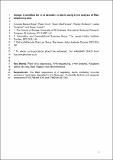Files in this item
Kodoja : a workflow for virus detection in plants using k-mer analysis of RNA-sequencing data
Item metadata
| dc.contributor.author | Baizan-Edge, Amanda | |
| dc.contributor.author | Cock, Peter | |
| dc.contributor.author | MacFarlane, Stuart | |
| dc.contributor.author | McGavin, Wendy | |
| dc.contributor.author | Torrance, Lesley | |
| dc.contributor.author | Jones, Susan | |
| dc.date.accessioned | 2019-03-12T13:30:08Z | |
| dc.date.available | 2019-03-12T13:30:08Z | |
| dc.date.issued | 2019-03-01 | |
| dc.identifier | 257678907 | |
| dc.identifier | 83bad0ed-ed18-4ed1-bca4-c3511c315060 | |
| dc.identifier | 30676315 | |
| dc.identifier | 85062389560 | |
| dc.identifier | 000460158100017 | |
| dc.identifier.citation | Baizan-Edge , A , Cock , P , MacFarlane , S , McGavin , W , Torrance , L & Jones , S 2019 , ' Kodoja : a workflow for virus detection in plants using k-mer analysis of RNA-sequencing data ' , Journal of General Virology , vol. 100 , pp. 533-542 . https://doi.org/10.1099/jgv.0.001210 | en |
| dc.identifier.issn | 0022-1317 | |
| dc.identifier.uri | https://hdl.handle.net/10023/17261 | |
| dc.description | This work was supported by the Biotechnology and Biological Sciences Research Council [BB/N023293/1]. The work of L.T., S.J., S.M. and P.C.was additionally supported by the Scottish Government’s Rural and Environment Science and Analytical Services division (RESAS) | en |
| dc.description.abstract | RNA-sequencing of plant material allows for hypothesis-free detection of multiple viruses simultaneously. This methodology relies on bioinformatics workflows for virus identification. Most workflows are designed for human clinical data, and few go beyond sequence mapping for virus identification. We present a new workflow (Kodoja) for the detection of plant virus sequences in RNA-sequence data. Kodoja uses k-mer profiling at the nucleotide level and sequence mapping at the protein level by integrating two existing tools Kraken and Kaiju. Kodoja was tested on three existing RNA-seq datasets from grapevine, and two new RNA-seq datasets from raspberry. For grapevine, Kodoja was shown to be more sensitive than a method based on contig building and blast alignments (27 viruses detected compared to 19). The application of Kodoja to raspberry, showed that field-grown raspberries were infected by multiple viruses, and that RNA-seq can identify lower amounts of virus material than reverse transcriptase PCR. This work enabled the design of new PCR-primers for detection of Raspberry yellow net virus and Beet ringspot virus. Kodoja is a sensitive method for plant virus discovery in field samples and enables the design of more accurate primers for detection. Kodoja is available to install through Bioconda and as a tool within Galaxy. | |
| dc.format.extent | 788807 | |
| dc.language.iso | eng | |
| dc.relation.ispartof | Journal of General Virology | en |
| dc.subject | QA75 Electronic computers. Computer science | en |
| dc.subject | QH301 Biology | en |
| dc.subject | QR355 Virology | en |
| dc.subject | DAS | en |
| dc.subject.lcc | QA75 | en |
| dc.subject.lcc | QH301 | en |
| dc.subject.lcc | QR355 | en |
| dc.title | Kodoja : a workflow for virus detection in plants using k-mer analysis of RNA-sequencing data | en |
| dc.type | Journal article | en |
| dc.contributor.sponsor | BBSRC | en |
| dc.contributor.institution | University of St Andrews. School of Biology | en |
| dc.contributor.institution | University of St Andrews. Biomedical Sciences Research Complex | en |
| dc.identifier.doi | https://doi.org/10.1099/jgv.0.001210 | |
| dc.description.status | Peer reviewed | en |
| dc.identifier.grantnumber | BB/N023293/1 | en |
This item appears in the following Collection(s)
Items in the St Andrews Research Repository are protected by copyright, with all rights reserved, unless otherwise indicated.

